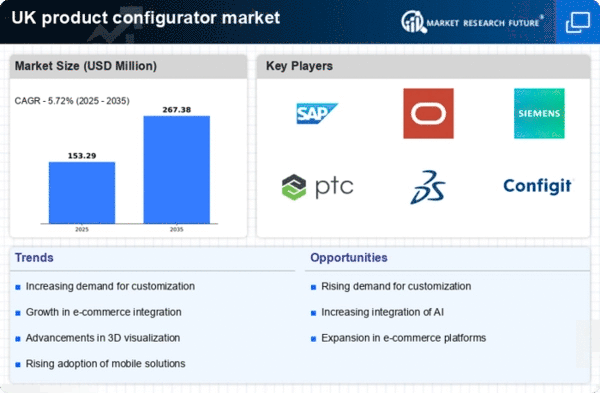Growth of E-commerce
The growth of e-commerce is significantly impacting the product configurator market. With the rise of online shopping, consumers are increasingly turning to digital platforms for their purchasing needs. In the UK, e-commerce sales have surged, with a reported increase of 30% in online transactions over the past year. This shift has prompted businesses to adopt product configurators to enhance their online offerings, allowing customers to personalize products from the comfort of their homes. The convenience and accessibility of online shopping, combined with the ability to customize products, are driving sales and engagement in the product configurator market. Companies that fail to optimize their online presence may miss out on substantial revenue opportunities.
Sustainability Trends
Sustainability trends are increasingly influencing the product configurator market. As consumers become more environmentally conscious, there is a growing demand for sustainable and ethically produced products. In the UK, approximately 60% of consumers are willing to pay a premium for products that are environmentally friendly. This shift is prompting businesses to incorporate sustainability into their product configurators, allowing customers to select eco-friendly materials and production methods. By aligning with these values, companies can enhance their brand image and appeal to a broader audience. The integration of sustainability into the product configurator market not only meets consumer demand but also contributes to a more responsible and ethical business model.
Technological Advancements
Technological advancements play a crucial role in shaping the product configurator market. The integration of artificial intelligence (AI) and machine learning (ML) technologies is revolutionizing how businesses interact with customers. These innovations allow for real-time customization and improved user experiences, which are essential in meeting the demands of today's consumers. In the UK, the adoption of 3D modeling and augmented reality (AR) tools is becoming increasingly prevalent, enabling customers to visualize their custom products before purchase. This technological evolution not only enhances the configurator experience but also streamlines production processes, potentially reducing costs by up to 20%. As such, businesses that leverage these technologies are likely to gain a competitive edge in the product configurator market.
Competitive Market Landscape
The competitive landscape of the product configurator market is intensifying as more players enter the field. Established companies and startups alike are recognizing the potential of product configurators to differentiate their offerings. In the UK, the market is witnessing an influx of innovative solutions aimed at enhancing customer engagement and satisfaction. This competition is fostering a culture of continuous improvement, where businesses are compelled to refine their configurator tools to stay relevant. As a result, companies are investing in research and development to create more intuitive and user-friendly interfaces. This competitive pressure is likely to drive advancements in the product configurator market, ultimately benefiting consumers through better products and services.
Rising Consumer Expectations
The product configurator market is experiencing a notable shift as consumer expectations continue to rise. Customers in the UK are increasingly seeking personalized products that cater to their specific needs and preferences. This trend is evident in various sectors, including automotive and fashion, where tailored solutions are becoming the norm. According to recent data, approximately 70% of consumers express a preference for brands that offer customization options. This growing demand for bespoke products is driving companies to invest in product configurators, enabling them to enhance customer satisfaction and loyalty. As a result, businesses that fail to adapt may find themselves at a competitive disadvantage in the product configurator market.
















